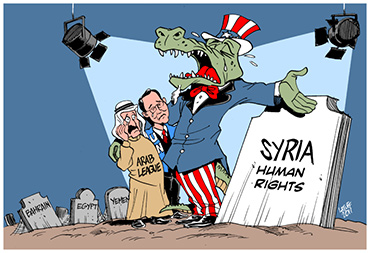
Alan Caruba
Why Syria?
By Alan Caruba

Conservatives are asking themselves why liberals, so opposed to Bush's war against Iraq and its dictator, Saddam Hussein, are so hell bent to get into a war in Syria and its dictator, Bashar al-Assad?
The President's assertion of a short attack has been called "the Goldilocks" approach to war, offered as a measured, limited response to the use of poison gas that killed over a thousand men, women and children in late August. Wars, however, do not lend themselves to such measures. They have a way of getting out of control, drawing in nations that have no wish to engage in them.
Moreover, there is ample reason not to rush into any military operation until we know whether, in fact, the poison gas was used by Assad or by rebel forces seeking to draw the U.S. and other nations into the conflict. Logically, there was no reason for Assad to use poison gas. All observers were of the view that he was winning the civil war at the cost of slaughtering 100,000 Syrians and turning millions into refugees.
This is not the first time the world has stood aside while such slaughters have taken place. It is an ugly truth, but it is the truth.
Who is rushing to resolve the horror that is Syria? Not the United Nations. Not NATO. Not Great Britain. Not Saudi Arabia. Not the Arab League. Nor has the United States to the point where Obama had to reverse course and ask for permission from Congress.
When you also consider the failure of the U.S. to arm "moderate" rebel forces as promised, it raises still more questions regarding who to arm and why the proposal has proven so resistant to fulfillment.
An element of the Benghazi scandal is the widespread belief that Libya was being used for the covert transfer of weapons, but that does not explain why the Obama administration blatantly lied about those who perpetrated the attack that killed an American ambassador and three security personnel, nor why there was no effort to come to their aid.
It is absurd to say that Assad's Syria represents a threat to American national security and the hearings on Capitol Hill made it clear that the Joint Chiefs are very reluctant to initiate an attack that, militarily, is not likely to do much to degrade Assad's ability to wage war. The Syrian operation comes at a time when the nation's military capacities have been worn down by more than a decade of fighting in the Middle East. Congress would have to make a special appropriation to cover the cost of the use and replacement of missiles.

Americans have been forced to witness a theatre of the absurd as Democratic Party spokespersons from Obama to Kerry, Pelosi to Wasserman-Schultz, defend the attack while supported by RINOs John McCain and Lindsay Graham. Even Republican leaders such as John Boehner and Paul Ryan have had to make the calculation to support Obama in order to avoid having the nation look weak in the wake of his "red line" statements.
The problem, however, is that the U.S. does look weak after its involvement in Afghanistan and Iraq. Adding Syria to the list will only enforce that perception.
It is more than a perception. It is a reality. A nation tottering on bankruptcy and default is, by definition, weak. A nation that has degraded its military power is, by definition, weak. A nation led by a vacillating, incompetent President is, by definition, weak.
It has taken barely five years for Obama to "fundamentally transform" America into a liberal cesspool of debt, widespread unemployment, and now a debate over whether to use military power to help him "save face" in a world where the fate of Syria is way down on the list of priorities, led by the increasingly desperate need to save America.
© Alan Caruba
September 5, 2013

Conservatives are asking themselves why liberals, so opposed to Bush's war against Iraq and its dictator, Saddam Hussein, are so hell bent to get into a war in Syria and its dictator, Bashar al-Assad?
The President's assertion of a short attack has been called "the Goldilocks" approach to war, offered as a measured, limited response to the use of poison gas that killed over a thousand men, women and children in late August. Wars, however, do not lend themselves to such measures. They have a way of getting out of control, drawing in nations that have no wish to engage in them.
Moreover, there is ample reason not to rush into any military operation until we know whether, in fact, the poison gas was used by Assad or by rebel forces seeking to draw the U.S. and other nations into the conflict. Logically, there was no reason for Assad to use poison gas. All observers were of the view that he was winning the civil war at the cost of slaughtering 100,000 Syrians and turning millions into refugees.
This is not the first time the world has stood aside while such slaughters have taken place. It is an ugly truth, but it is the truth.
Who is rushing to resolve the horror that is Syria? Not the United Nations. Not NATO. Not Great Britain. Not Saudi Arabia. Not the Arab League. Nor has the United States to the point where Obama had to reverse course and ask for permission from Congress.
When you also consider the failure of the U.S. to arm "moderate" rebel forces as promised, it raises still more questions regarding who to arm and why the proposal has proven so resistant to fulfillment.
An element of the Benghazi scandal is the widespread belief that Libya was being used for the covert transfer of weapons, but that does not explain why the Obama administration blatantly lied about those who perpetrated the attack that killed an American ambassador and three security personnel, nor why there was no effort to come to their aid.
It is absurd to say that Assad's Syria represents a threat to American national security and the hearings on Capitol Hill made it clear that the Joint Chiefs are very reluctant to initiate an attack that, militarily, is not likely to do much to degrade Assad's ability to wage war. The Syrian operation comes at a time when the nation's military capacities have been worn down by more than a decade of fighting in the Middle East. Congress would have to make a special appropriation to cover the cost of the use and replacement of missiles.

Americans have been forced to witness a theatre of the absurd as Democratic Party spokespersons from Obama to Kerry, Pelosi to Wasserman-Schultz, defend the attack while supported by RINOs John McCain and Lindsay Graham. Even Republican leaders such as John Boehner and Paul Ryan have had to make the calculation to support Obama in order to avoid having the nation look weak in the wake of his "red line" statements.
The problem, however, is that the U.S. does look weak after its involvement in Afghanistan and Iraq. Adding Syria to the list will only enforce that perception.
It is more than a perception. It is a reality. A nation tottering on bankruptcy and default is, by definition, weak. A nation that has degraded its military power is, by definition, weak. A nation led by a vacillating, incompetent President is, by definition, weak.
It has taken barely five years for Obama to "fundamentally transform" America into a liberal cesspool of debt, widespread unemployment, and now a debate over whether to use military power to help him "save face" in a world where the fate of Syria is way down on the list of priorities, led by the increasingly desperate need to save America.
© Alan Caruba
The views expressed by RenewAmerica columnists are their own and do not necessarily reflect the position of RenewAmerica or its affiliates.
(See RenewAmerica's publishing standards.)
















